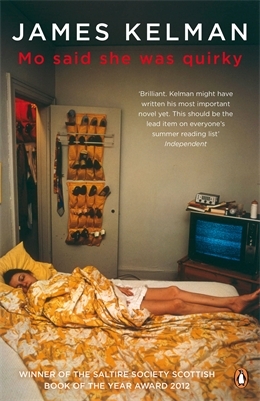Mo Said She Was Quirky by James Kelman

James Kelman asks a lot from his readers. His novels are often aggressively everyday in their settings and plots at the same time as being claustrophobically intimate with their characters, whose streams of consciousness spill onto the page in what feels like real time. His latest, Mo Said She Was Quirky, fits the author’s well-established mould exactly, offering a day in the life, and a day in the head, of struggling young mother Helen.
The story, as far as there is one, begins with Helen finishing the night shift at a West End casino and travelling home (a bedsit somewhere south of the river) in a taxi, from which she thinks she sees her long-estranged brother Brian. This sighting kick-starts the long swirl of memories and musings that form the bulk of the book.
Each new event in the course of Helen’s day – making breakfast for her six-year-old daughter Sophie, struggling to sleep, having sex with her boyfriend, heading back to work – combines and folds back into the same thoughts about her troubled family life that are sketched in the first 20 pages. It’s superbly controlled and shows the author’s innate empathy for those struggling on the fringes, but it’s also tough going: Kelman makes no concessions to his readers’ enjoyment and seems to want to put them through the same boredom and drudgery of Helen’s existence.
One way he does this is through his sentences themselves, which get snagged on their own ideas and stuck in recursive loops: “Other shadows now, and a darkness. Oh but darkness, what is darkness, just darkness of mood, if her mood was dark.” Pages of this, alongside lost-looking characters and bleak settings, are fleetingly reminiscent of Beckett, but lack something of his troubled humour and imaginative reach. Other times the style just comes across as hammy and forced: “Helen felt quite weird really but okay too like she was just like – okay, really.”
More frustrating though is the fact that underneath this are potentially important stories about race relations (Helen’s boyfriend, the eponymous Mo, is Pakistani-English and won’t introduce her to his family) or parenthood, or the plight of the poor in coalition Britain. Kelman has more than enough sensitivity to explore these topics in depth, but the obsessive, broken-record prose means they never get a proper airing.
The editorial unit
Mo Said She Was Quirky is published by Penguin at the paperback price of £8.99, for further information visit here.

























Facebook
Twitter
Instagram
YouTube
RSS